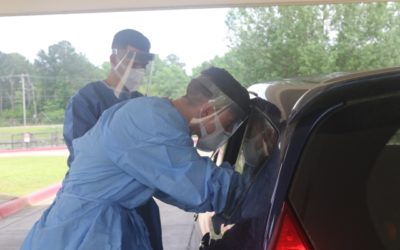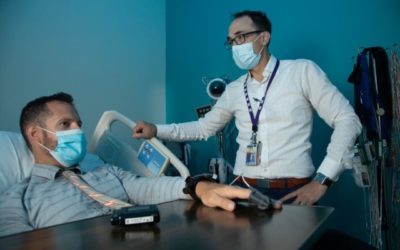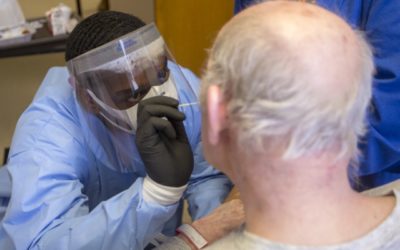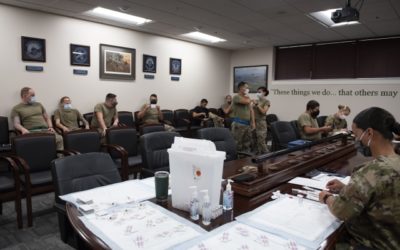A retrospective cohort study of 9,904 VHA patients with clinical Stage I NSCLC determined that surgical procedures delayed more than 12 weeks from the date of radiographic diagnosis were associated with increased risk of recurrence and worse overall survival.
COVID-19 Shots Protected VA Cirrhosis Patients
Administration of mRNA COVID-19 vaccines to veterans with cirrhosis resulted in a delayed and modest reduction in infection rates. Excellent protection against related hospitalization or death was achieved, however, according to a new study.
No Link Between AMI, Two-Dose HBV Vaccine
The overall prevalence of chronic hepatitis B infection in the United States is estimated to be around 1.59 million That’s one of the reasons the DoD, which has required hepatitis B vaccination for new recruits for nearly 20 years, added the mandate for existing servicemembers to receive the vaccine in 2014.
Unexpected Benefit for Minority Veterans: Easier Access to COVID Testing
The COVID-19 pandemic laid bare the impact of disparities in access to healthcare and ongoing differences in the seriousness accorded to minority patients’ health concerns. It also revealed significant benefits of receiving care through the VA.
Veterans Receiving Total Knee Replacements at VA Facilities
Thanks to the MISSION Act, VA is increasing purchasing healthcare for veterans in the communities where they live.
Deprescribing BP Medications in Older, Frail Patients Can Be Right Thing to Do
Growing evidence from observational studies signals that prescribing multiple antihypertensive prescriptions might do more harm than good in older patients with polypharmacy and comorbid conditions.
PTSD Medications Change Over Time in VHA
What medications tend to be prescribed for veterans diagnosed with post-traumatic stress disorder, and how has that changed over time?
Somatic Symptom Disorder Ups PTSD Risk
In somatic symptom disorder, patients develop too much focus on physical symptoms, such as pain, weakness or shortness of breath, which causes them significant distress and often creates problems for normal function, according to the American Psychiatric Association.
LAIs Improve VHA Schizophrenia Medication Adherence
Ensuring high rates of medication adherence is one of the greatest challenges in treating schizophrenia patients at the VA and elsewhere.
COVID-19 Pandemic Provides Lessons on Protecting VA LTC Facilities
The VA can learn important lessons from how it handled infection control in its senior centers during the height of the COVID-19 pandemic, according to a recent Government Accountability Office (GAO) report.
Why Gay, Lesbian and Bisexual Vietnam Veterans Suffer More From PTSD
Lesbian, gay and bisexual veterans who served in the Vietnam era reported more post-traumatic stress disorder and other mental health issues than their heterosexual counterparts, and a new analysis of data from a nationwide study survey questioned whether that was related to past trauma related to sexual identity.
Insomnia Has Affected Nearly 1 in 5 Veterans During the Pandemic
Sleep is essential to mental and physical well-being, and not getting enough sleep can lead to stress or difficulties concentrating, solving problems—even fighting off infection. At the same time, stress and anxiety can also lead to disrupted sleep.
Benefit Found for Testing Veterans With Hepatitis B for Liver Cancer
The most common risk factors worldwide for liver cancer are chronic infection with hepatitis B virus or hepatitis C virus, according to the American Cancer Society.
Risk of Acute Liver Injury Found to Be Low With Hepatitis C ‘Cure’
More than 5% of U.S. veterans are infected with chronic hepatitis C (HCV)—roughly triple the rate of the general population, with the percentage, 10%, even higher among those born between 1945 and 1965.
Study Describes the Success of the VA’s Hepatic Innovation Team Collaborative
Hepatitis C can lead to serious liver diseases including cirrhosis and liver cancer—particularly hepatocellular carcinoma, which accounts for about 90% of all liver cancer cases.
NAFLD Is Dramatically Growing as a Cause of Hepatocellular Carcinoma
The worldwide prevalence of nonalcoholic fatty liver disease-related hepatocellular carcinoma is expected to increase in line with the growing obesity epidemic.
Hepatocellular Carcinoma Diagnosis Delays Common for Veterans With Cirrhosis
What factors are behind delays in diagnosis of hepatocellular carcinoma in veterans who have cirrhosis of the liver?
Nasopharyngeal Swabs Superior for Diagnosing SARS-COV-2 Infection
Identifying SARS-CoV-2 infections quickly and accurately is critical to managing the COVID-19 pandemic and reducing community spread of the virus.
Veterans’ Diseases Presumed to Be Linked to Agent Orange Exposure
VA has recognized certain cancers and other health problems as presumptive diseases associated with exposure to Agent Orange or other herbicides during military service. Veterans and their survivors may be eligible for benefits for these diseases.
VA Begins Processing Claims for New Conditions Related to Agent Orange
Last month, VA began processing disability claims for asthma, rhinitis and sinusitis on a presumptive basis for veterans who served in southwest Asia and some other areas.
Unexpected Results Revealed No Boost in Veteran Suicide Rate During Pandemic
Past research has suggested that suicide rates rose during the 2018 influenza epidemic—unrelated to World War I and Prohibition—and during the 2003 severe acute respiratory syndrome outbreak among older adults in Hong Kong.
Military, VA, Other Federal Medicine Agencies Mandate COVID-19 Vaccines
The Food and Drug Administration’s full approval of the Pfizer-BioNTech COVID-19 vaccine paved the way for a sweeping vaccine mandate for military personnel.
Strebel Helps Create Tool to Identify VA COVID-19 Patients Most at Risk
Is it possible to create an algorithm that not only accurately predicts which COVID-19 patients will be hardest hit by the virus but will also be accepted and trusted by clinicians?
VA Declines to Add Controversial Alzheimer’s Drug to Formulary
The VA joined several other major players in the health care market in deciding not to add the recently approved—and controversial—Alzheimer’s drug aducanumab (Aduhelm) to its national formulary.
Smell Loss Might Signal Neurodegenerative Disease Risk in COVID-19 Survivors
In the early days of the pandemic, Col. Michael Xydakis, MD, a director at the Air Force Research Laboratory, was intrigued by reports of anosmia occurring with COVID-19.
NAFLD Is Dramatically Growing Cause of Hepatocellular Carcinoma
SINGAPORE – The worldwide prevalence of nonalcoholic fatty liver disease-related hepatocellular carcinoma is expected to increase in line with the growing obesity epidemic. NAFLD already is the fastest-growing cause of the liver cancer in the United States, France and...
Benefit Found for Testing Veterans With Hepatitis B for Liver Cancer
SEATTLE, WA – The most common risk factors worldwide for liver cancer are chronic infection with hepatitis B virus or hepatitis C virus, according to the American Cancer Society. Both of those infections lead to cirrhosis of the liver, but, in the United States, ...
Hepatocellular Carcinoma Diagnosis Delays Common for Veterans with Cirrhosis
HOUSTON – What factors are behind delays in diagnosis of hepatocellular carcinoma in veterans who have cirrhosis of the liver? A recent study examined the frequency of delayed diagnosis and the factors involved in a cohort of VHA cirrhosis patients. Results were...
COVID-19 Vaccine Expected to Be Required for Military Personnel This Month
The DoD plans to request a presidential waiver to require all servicemembers to receive the COVID-19 vaccine starting in mid-September, according to a memo sent by Defense Secretary Lloyd Austin.
Two mRNA COVID-19 Vaccines Averaged Above 95% Effective in Veterans
Veterans enrolled in VA care are not a typical population of U.S. patients. Because of older age, higher burden of comorbidities and higher prevalence of social vulnerability factors, they are at higher risk for a range of health consequences.








